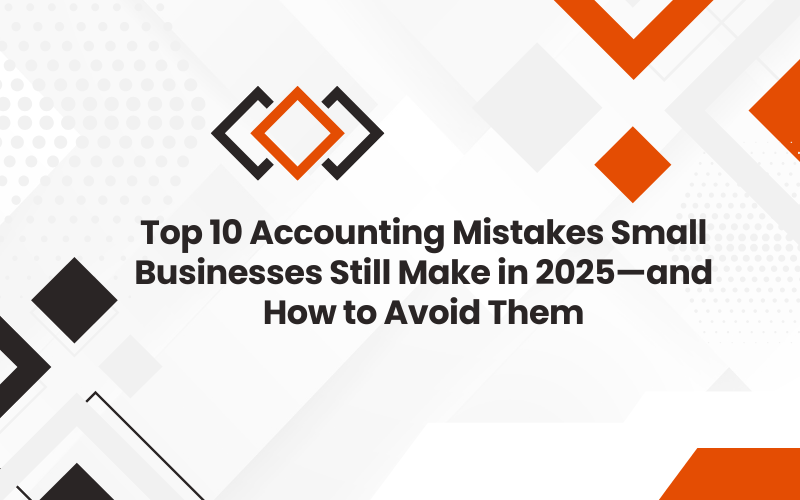Running a small business is exciting, but when it comes to accounting, one wrong move can lead to costly consequences. Even in 2025, many small businesses are still repeating the same avoidable mistakes. Whether you’re managing your books solo or working with a part-time accountant, this post will help you spot red flags early and stay audit-ready.
Let’s break down the top 10 accounting mistakes small businesses are making this year—and what you can do to avoid them.
1. Mixing Business and Personal Finances
Still one of the biggest no-nos. Using one bank account for both business and personal transactions makes it harder to track expenses, complicates taxes, and increases the risk of an audit.
To fix it: Open a dedicated business bank account and business credit card. Use tools like QuickBooks or Wave to sync only business-related transactions.
2. Skipping Monthly Reconciliations
If you’re not reconciling your bank statements every month, you’re flying blind. You might miss errors, fraud, or duplicated entries.
To fix it: Set a monthly calendar reminder to reconcile all accounts. Use reconciliation features in accounting software or Excel templates.
3. Poor Record-Keeping
Receipts stuffed in drawers? Invoices saved randomly on desktops? Without proper documentation, you can’t justify your expenses.
To fix it: Go digital. Use apps like Dext, Expensify, or Microsoft Lens to scan and organize receipts. Back up everything to the cloud.
4. Misclassifying Expenses
Putting “entertainment” expenses under “travel” or mixing cost-of-goods with operating expenses can throw off your entire profit picture.
To fix it: Learn the basic chart of accounts categories. Stick to consistent classifications and review them monthly.
5. Neglecting Accounts Receivable
If you’re not tracking who owes you money—and when—it’s easy to forget to follow up on payments.
To fix it: Use aging reports to monitor overdue invoices. Set up automatic reminders for clients through invoicing software.
6. Not Backing Up Data
Hardware fails, files get corrupted, and accidents happen. If your financial data lives on one device, you’re asking for trouble.
To fix it: Store accounting data on cloud-based platforms or set up automated daily backups using tools like Google Drive or Dropbox.
7. DIY Accounting Without Enough Knowledge
Many business owners try to handle accounting themselves to save money, but without training, this can lead to incorrect reporting and tax trouble.
To fix it: Invest in an accountant (even part-time) or take a basic course in accounting and tax compliance.
8. Ignoring Tax Deadlines and Compliance
Missing filing deadlines or underestimating taxes can attract fines, penalties, or audits.
To fix it: Use a tax calendar. Hire a tax pro for quarterly reviews. Consider setting aside a tax reserve account.
9. Overlooking Petty Cash or Minor Expenses
Petty cash transactions may seem small, but they add up fast. Ignoring them causes inaccurate expense reporting.
To fix it: Track all expenses—even the small ones. Keep petty cash logs and require receipts for every transaction.
10. Not Reviewing Financial Reports Regularly
If you’re only looking at your finances at year-end, you’re missing insights that could grow your business or catch early problems.
To fix it: Schedule monthly reviews of your income statement, balance sheet, and cash flow. Use dashboards to visualize trends.
Conclusion
Small businesses don’t need to become accounting experts, but avoiding these 10 common mistakes will help you stay compliant, save money, and make better business decisions. In 2025, smart accounting is about being proactive, not reactive.
Free Download: “Monthly Accounting Health Checklist”
Want to keep your accounting on track all year long?
[Download the FREE checklist here]






